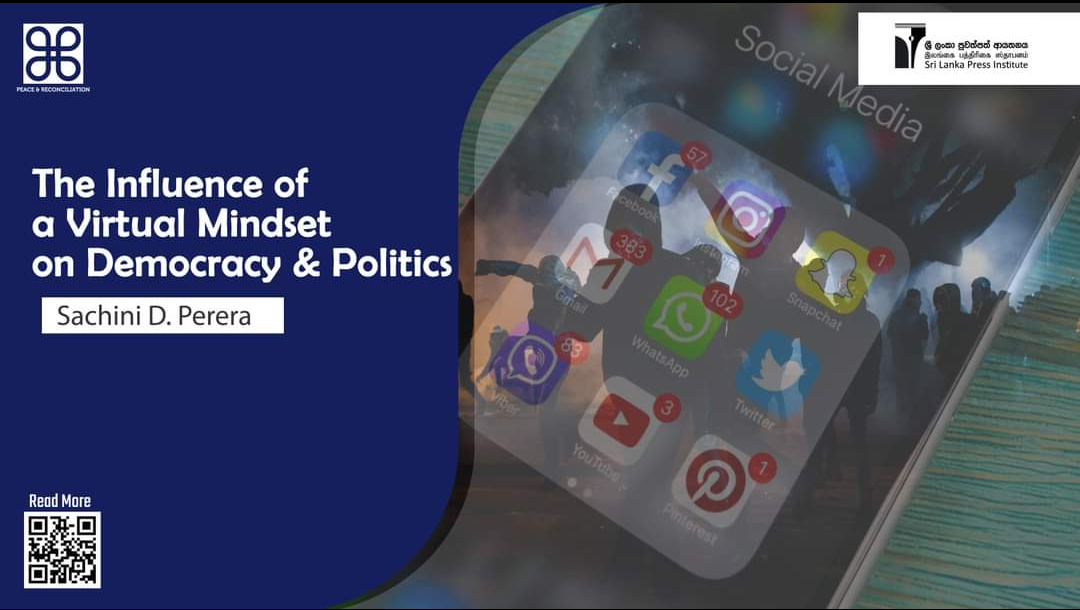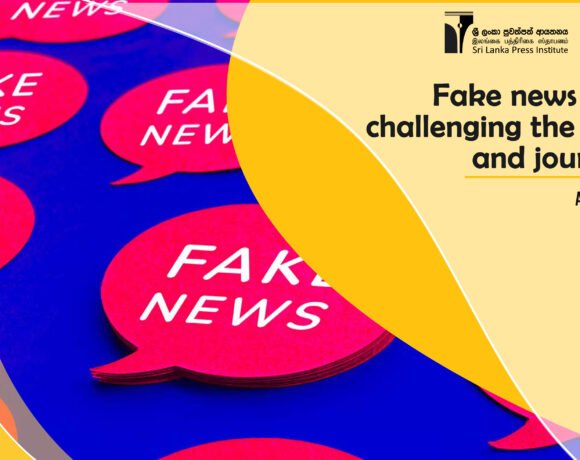
The Influence of a Virtual Mindset on Democracy & Politics
Sachini D. Perera
The human is an inherently political parasite acting against those who act against their own political ideologies and agendas. It is the major motivation for rapid socio-political transformations in human society. There are two key challenges here. One is that new media enables a rapid, global reach of news. The second challenge is that a bulk of that news is inaccurate and/or incomplete, leading to the dissemination of misinformation. Since most people believe what they see, hear and experience, these two challenges can lead to acts of violence and conflict. They also severely influence politics. Ideally, a political democracy should lead people to noble actions, happiness and inner peace. With these challenges however, is not the case.
The current socio-political transformation in Sri Lanka is undergoing an ideological crisis to uplift national peace and reconciliation in order to avoid further political chaos. In today’s context, we see many people sharing hateful content around topics like extremism, racism, terrorism, minority and religious discrimination that has no real basis and mainly influenced by politics. We have seen many social media users campaigning towards their political biases through posts, videos, memes, captions, cartoons, comments, articles that circulate in virtual platforms. Why do humans have a tendency to create disharmony by any means? “As long as people don’t meet a society living with transparency, human rights, social justice and democracy, they do not see the need for political morality” stated Darshana Ashoka Kumara, visiting lecturer for Mass Media and Communication Studies.
Instead of physical conflicts, people engage in virtual combats these days and they campaign using hate speech and circulate misinformation via social media. According to Mr Darshana Ashoka Kumara, social media is a good organizing tool for political violence. Since major social media platforms such as Facebook, Twitter, Whatsapp, Instagram, YouTube, etc. have been widely used in Sri Lanka, we see the long-term passive behaviours of politically-radical activists on these platforms.
There are a certain number of individuals who carry out their arbitrary political propagandas that disseminate fake and false information and use hate speech related to major political incidents and popular political parties in the country. For instance, Yasith Dilshan, Nadun Chameera Widana Gamage-Pawel, Athula Dharmadasa, Dasun Wanaguru, Rekha Kahandagama II, Peechan Mahaththaya, Sri Lankan Blood-1, Sri Lankan Political are some such popular social media profiles. When we refer to the social media contexts in these profiles, pages and groups, it firmly reflects a deficiency in political morality in Sri Lankan society.
Most regions of the world also experience similar crises since social media governs the potential of a nation in different forms and degrees. As mentioned, we still encounter two major challenges; the swiftness of communicative drivers and multiplicity of information together with new technology. Political agendas are hard to eliminate from society but can be reduced to some extent.
As Mr Darshana’s explained, politically-biased and hateful language-based content intensifies political violence while creating a stereotyped or anti-rational social being. When we look into recent incidents like the ethnic riots between the Muslim minority and Sinhala Buddhist majority in Digana-Theldeniya, Aluthgama, Beruwala, they can be seen as examples of violent acts caused due to social media in Sri Lanka. It strongly impacted the socio-political status of the country. Therefore, local access to social media networks was instantly blocked due to the state of emergency in the country, preventing further spread of underlying political propagandas. Even the Easter Sunday bombings, 20th Amendment, Covid-19 first-wave lockdown, recent deforestation incidents, demolition of Buwanekabahu Royal Pavilion, etc. are some widely known instances of passive virtual behaviours among social media users towards political violence.
The protective laws in charge of “freedom of speech” have also switched off in this regard, stated Drashana Kumara. Yet, the current government or the previous governments have not legally implemented fair trials on politically-violent cases both in the online and the offline world. The Act for International Covenant on Civil and Political Rights (ICCPR) was legitimized for this issue. In many cases related to virtual political violence, the ICCPR Act has clearly been implemented to limit authors, journalists and the local community at large. But Sri Lankan political figures use their power arbitrarily in anti-democratic exercises and are still publicly talking about political democracy, he further explained.
We lack sufficient social media literacy to implement good political implications. The appropriate measures and reforms in judicial proceeding and law should be further extended to overcome and reduce political violence occurrences not only in virtual platforms but also in the real or the offline world, stated Darshana Ashoka. Politics is a legislative science that should be carefully and wisely managed within the World Wide Web (WWW) and social media which can even decide on global politics. It could also become a dilemma which is toxic to the social health of Sri Lanka. Peace is designed for the living to enjoy, sooner or later. Tolerance and coexistence in public perception are very mean for human peace. Therefore, we should not raise our virtual literacy towards anti-democratic hatred.









